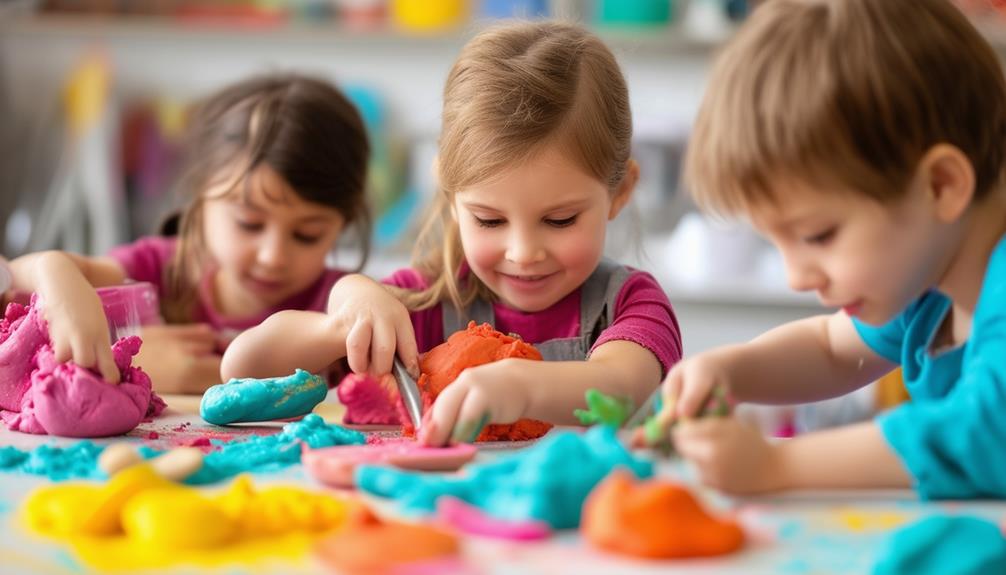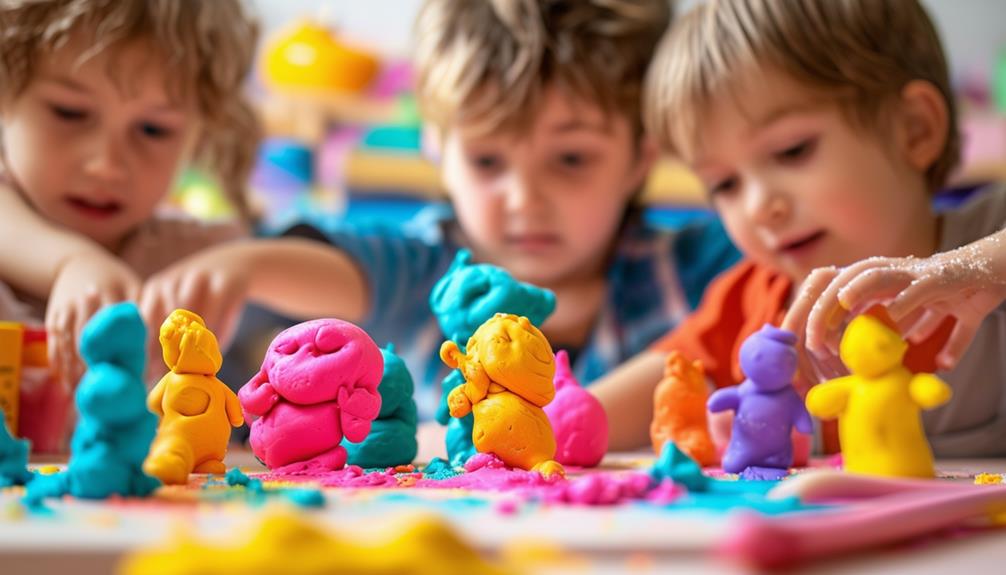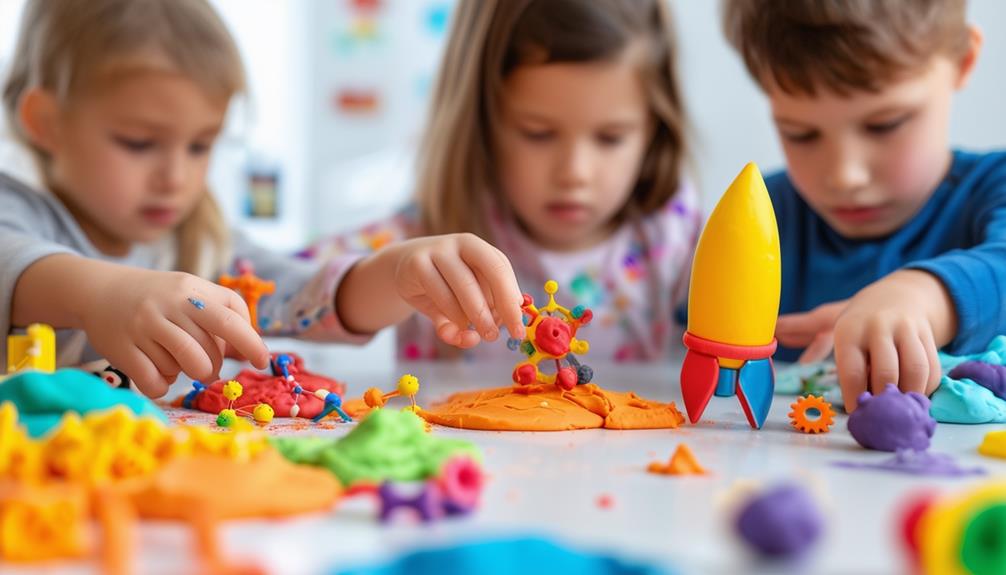The Benefits of Playdough for Child Development

When you think about playdough, you might just see a basic toy. However, it's actually a powerful tool for child development. Engaging with playdough strengthens hand muscles, refines finger control, and improves coordination. It also enhances sensory learning through tactile and olfactory experiences. Beyond these physical benefits, playdough supports social and emotional growth, allowing children to express their emotions and develop social skills. Additionally, it sparks creativity and enriches language skills. There's much more to discover about the multifaceted benefits of playdough in child development.
Developmental Benefits
Engaging with playdough offers a range of developmental benefits essential for a child's growth. When children play with playdough, they develop fine motor skills by strengthening hand muscles, refining finger control, and improving coordination—skills crucial for tasks like writing, buttoning, and using scissors.
Playdough also provides significant sensory benefits. As children squish, roll, and mold the dough, they engage in tactile exploration that enhances sensory learning. The various textures and scents of playdough stimulate the olfactory system and offer proprioceptive input, helping children understand their body's spatial orientation.
Moreover, working with playdough can enhance cognitive skills. Children use their imagination and creativity to shape diverse objects and scenarios, fostering problem-solving and innovation. They also expand their vocabulary by discussing their creations and storytelling, enriching their language development.
Social and Emotional Growth
Playing with playdough allows children to express their emotions in a safe and creative manner, helping them manage stress and build self-esteem. This activity also fosters communication and teamwork, essential for developing social competence. By engaging with playdough, children acquire valuable skills that support their social and emotional growth.
Enhances Emotional Expression
Children frequently use playdough as a hands-on outlet to express and understand their emotions. This activity encourages them to shape and mold their feelings into tangible forms, aiding in the identification and articulation of emotions. Playing with playdough can ease tension and improve emotional understanding and expression. It provides a non-verbal way for kids to communicate their inner experiences, facilitating the processing of complex emotions.
Tactile sensory experiences from playdough offer a calming effect, especially beneficial when a child feels overwhelmed or anxious. The repetitive motions of kneading and rolling help center their thoughts and bring order to their emotional state. Additionally, playdough activities allow children to act out scenarios and stories that mirror their emotional experiences. This helps them explore different emotional responses and outcomes in a safe and controlled environment.
Builds Social Competence
Playing with playdough helps kids develop crucial social skills such as sharing, turn-taking, and effective communication. When children engage in playdough activities, they naturally learn to cooperate and negotiate roles, fostering healthy social interactions. Sharing tools and materials necessitates clear communication, enhancing their ability to express needs and understand others.
Through collaborative projects, children practice problem-solving and empathy by considering their peers' perspectives. This cooperative play strengthens relationships and builds a sense of community. Kids also learn to manage conflicts and regulate their emotions, fundamental components of social-emotional growth.
Moreover, playdough activities provide a safe environment for children to express their feelings and practice self-regulation. By modeling and practicing turn-taking, kids acquire valuable social skills that will benefit them in diverse settings. They build self-esteem by contributing to group efforts, knowing their input is valued.
In essence, playdough is more than just a fun activity; it's a powerful tool for building social competence. It equips children with the skills needed to navigate relationships, understand others, and become empathetic, cooperative individuals. Encourage playdough play and watch your child's social skills flourish.
Creativity and Imagination

When your child plays with playdough, they're engaging in more than just fun; they're expressing artistic ideas and expanding their imagination. By molding the dough into various shapes and objects, they explore different scenarios and develop symbolic thinking. This type of play supports creativity and storytelling, which are crucial for cognitive growth.
Expressing Artistic Ideas
Through sculpting, shaping, and crafting unique designs, playdough enables children to express their artistic ideas and spark their creativity. This versatile medium serves as a canvas for imagination, allowing kids to bring their most imaginative concepts to life. By engaging in imaginative play with playdough, children enhance their language skills through storytelling and narrative construction, often describing their creations and the tales behind them.
Playdough offers a multifaceted approach to developing artistic abilities, with three key benefits:
- Experimentation with Colors and Textures: Children can mix various colors and textures, learning about combinations and differences, which nurtures their artistic senses.
- Shape and Form Exploration: Kids explore different shapes and structures, improving their spatial awareness and fine motor skills.
- Enhancing Self-Expression: Playdough provides a safe environment for children to express their feelings and ideas, boosting their confidence and self-expression.
Symbolic Play Development
Children develop symbolic play skills using playdough by crafting imaginative scenarios that bring their ideas and stories to life. Engaging in pretend play with playdough enhances their ability to understand abstract concepts through symbolic representation. This type of play allows them to express complex ideas and create diverse narratives, fostering both creativity and imagination.
Symbolic play with playdough promotes expressive storytelling, enabling kids to create entire worlds and characters. This provides an outlet for articulating thoughts and emotions tangibly, which is essential for language and cognitive development.
Additionally, imaginative play with playdough benefits social and emotional growth. As children explore different roles, perspectives, and scenarios, they develop greater empathy and understanding of others. This form of play helps them navigate social relationships and build emotional intelligence.
Language and Literacy
Playing with playdough enriches children's language and literacy skills by encouraging them to describe their creations and invent stories. When kids manipulate playdough, they build early literacy skills by talking about what they're creating. This dialogue helps children learn new vocabulary and improves their ability to express ideas. Playdough activities also stimulate pre-writing skills. The act of rolling, squishing, and shaping dough strengthens hand muscles and improves coordination, which are crucial for writing.
Playdough also introduces children to early literacy concepts. By incorporating shapes and letters into play, kids interact with the alphabet in a hands-on and engaging manner. This playful approach to learning makes abstract concepts more tangible and accessible.
Three key benefits of playdough for language and literacy development are:
- Vocabulary Expansion: Describing playdough creations encourages children to use new words and phrases.
- Storytelling Skills: Creating and narrating stories about their dough figures helps develop narrative skills.
- Pre-Writing Development: Manipulating playdough strengthens hand muscles, building the foundation for future writing tasks.
Integrating letters and numbers into playdough activities further improves language and numeracy skills. Through this interactive exploration, kids grasp early literacy and numeracy concepts in a fun, memorable way.
STEM Learning

Engaging with playdough offers children a hands-on introduction to STEM learning, allowing them to explore scientific concepts and mathematical thinking in a playful environment. When kids play with playdough, they're not just having fun—they're developing critical observation skills and enhancing their scientific reasoning. By experimenting with various materials, textures, and shapes, they begin to understand cause-and-effect relationships, which are fundamental to science.
In terms of mathematical thinking, manipulating playdough helps children grasp concepts like volume and symmetry. They learn to solve problems creatively, which is vital for cognitive development. For instance, when they try to balance a structure or create a specific shape, they're honing their problem-solving skills.
Playdough also encourages children to explore spatial relationships and geometric shapes. Rolling out the dough and cutting it into different forms helps them understand how shapes fit together and transform in space. These activities lay the groundwork for more complex math skills they will encounter later on.
Through these playful yet educational experiences, children build a solid foundation in STEM learning that will benefit their future academic pursuits in science, technology, engineering, and mathematics.
Sensory Experiences
Playdough offers a rich sensory experience that captivates children's senses and supports their developmental growth. When children engage with playdough, they activate their tactile sensory system through its soft, squishy texture, which allows for endless manipulation. This hands-on activity strengthens hand muscles and enhances sensorimotor development as they mold, flatten, and shape the dough.
Incorporating scents into playdough further enriches these sensory experiences by engaging the olfactory senses. Scents like lavender, peppermint, or lemon transform playtime into an olfactory adventure, making it more engaging and stimulating.
Playdough also provides valuable proprioceptive input. The pushing, pulling, and shaping activities involved help children develop a better sense of body awareness and spatial positioning, which are crucial for motor planning and coordination.
Three Key Benefits of Playdough for Sensory Development:
- Tactile Discovery: Children explore different textures and consistencies, stimulating their tactile sensory system.
- Proprioceptive Engagement: Activities like rolling and squeezing offer significant proprioceptive input.
- Olfactory Excitement: Adding scents enriches sensory exploration.




